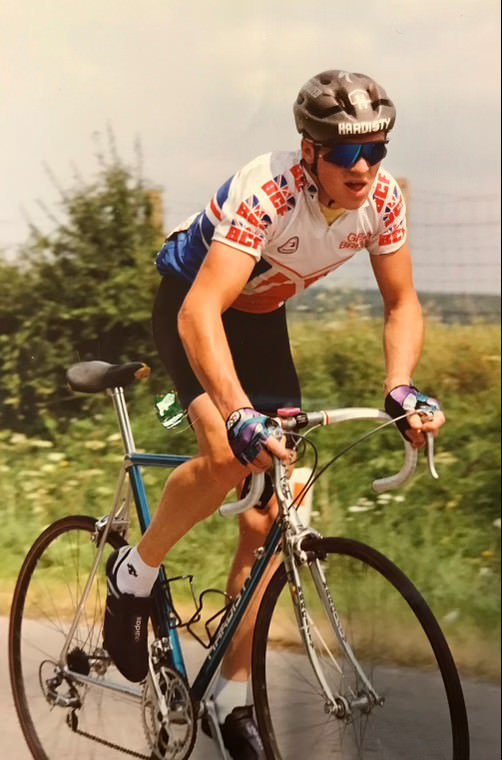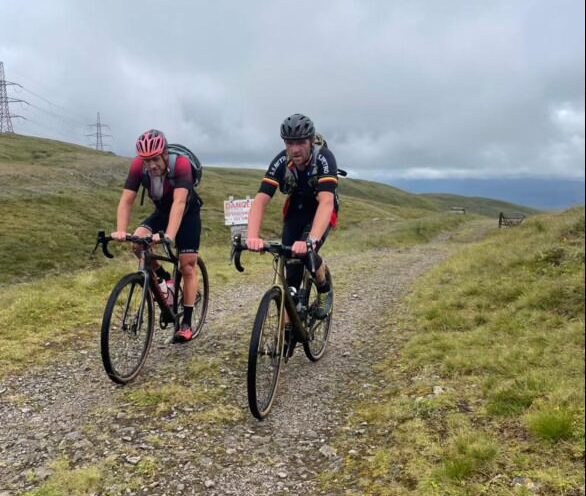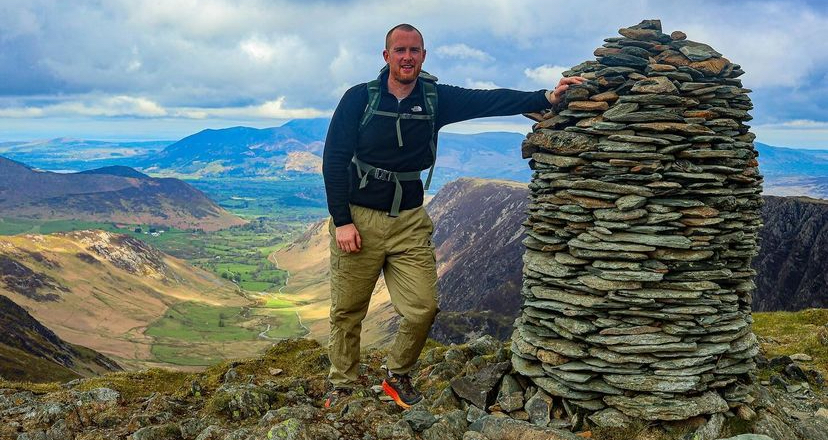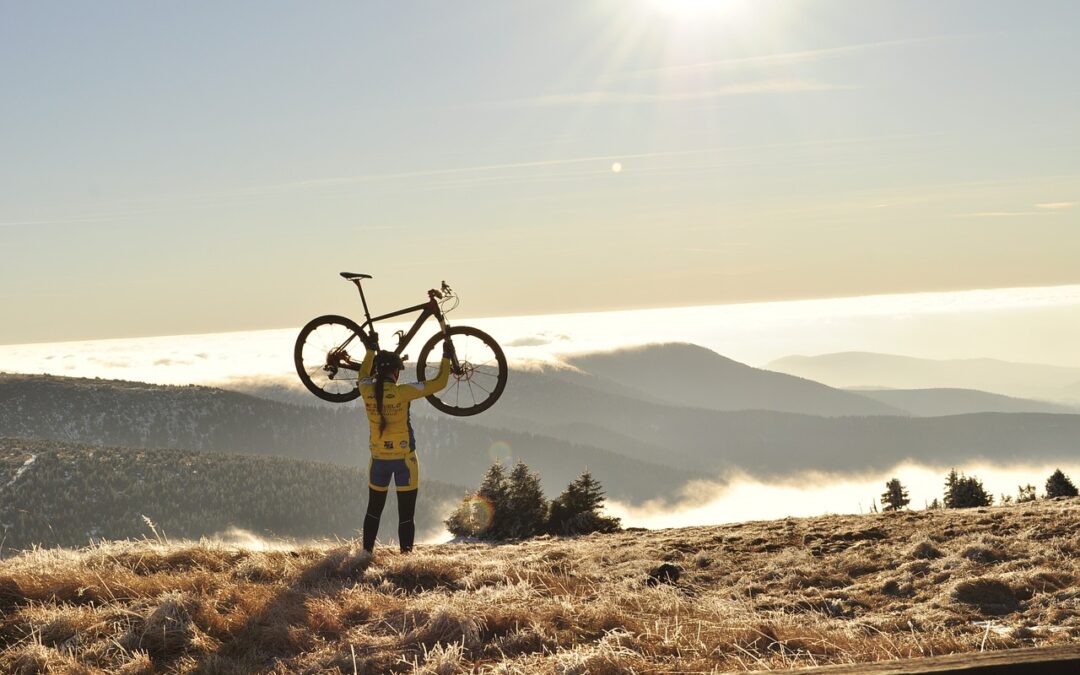Road cycling may still reign supreme, but two forms of the sport that began ‘underground’ have taken over and Simon Telford certainly has some tales from the track.
From the Dirty Reiver to the Frontier 300, events for gravel and endurance cycling have begun to appear nationwide; supplying a higher demand.
Meet Simon Telford, an ex-road racer and Great British athlete turned cycling fanatic residing in the North East.
He now prioritises gravel and endurance style riding, joining the boom in recent years. Highlighting its accessibility and community spirit.
“I’ve had stressful periods at work and you, just, you get out and you can switch off, particularly when you’re on the gravel bikes. I think the adventure side of gravel racing is what would appeal to most people. The atmosphere is fantastic, there’s a sense of camaraderie. You’ve got people of all different abilities who’ll be having highs and lows in the same event,” Simon told Nine To Alive.
“Endurance rides are full of great spirit. It’s far less brutal than a road race used to be know if you were, if you were an alien watching a road race, you can tell straight away because the leader is the leader. In endurance we’ve all got our own goa and time to achieve.”
His preference for off-road was not always the case, as his road cycling career began at the age of 12; with his dad getting him into the sport.
He joined the ‘big club scene’ at the time and progressed to competing at a national and international level; with his first being Ridley Cycling Club
Big moments…
During his youth, Simon raced with and against seasoned professionals, and represented Great Britain in Belgium’s Tour Of Hainault race.
He also competed and won a number of races for the North East Racing club.


Unfortunately his career was stopped in its tracks.
He said: “Racing frequently and dealing with tonsillitis all the time finished me off eventually. I was putting a lot of money into it and 500 miles a week in training runs you down.”
This was not the last time Simon would step onto the bike. He would return 25 years later.
Why did he shift to gravel and endurance?
After an amateur football career with countless hours of golf and a few half marathons and settling down with his family he was still missing that cycling fix that had formed a huge part of his childhood. On his 50th birthday, Simon and his mates came back together for a riding reunion.
“We came back for a point to point, as they call them, from Inverness down to Glasgow. It’s a famous route called the Badger Divide.”
They came back to do the same a year later. This became the catalyst, falling back in love with cycling, Simon swapped the road for the beaten track.
Three Dirty Reivers later, and he is still going strong and keeping fit. He manages to train during his downtime before and after work and is lucky enough to get a spot most years.
“The Dirty Reiver sells out in seconds. It’s sold out. It’s got 2000 participants in it, all sorts of people, all sorts of abilities,” Simon said.
“To train for events like that I do about 14, 15 hours on the bike a week, around 200 miles. I tend to go out early in the mornings and supplement that with gym workouts like the cross-trainer.”
Of course, his rides are not always straightforward. During his many endurance and gravel events he and his mates have faced life-threatening circumstances. He spoke about a difficult moment during the Badger Divide.
“One of my mates didn’t take the right kit and it cost him. It was a September date and it’s 12 degrees. Once we got up to two and a half thousand feet it started snowing. I did warn him that he needed to be equipped, you’ve got to have good waterproofing and he didn’t. As we got higher he started getting the first signs of hypothermia.
“We were at the most remote point, there’s no one coming for you. It started getting dark and we’d definitely underestimated it having been a bit pissed the night before.
“That didn’t help Mike, he started really suffering. I had to lend him a jacket and dress, get him as warm as I possibly could.”
Unfortunately they had to bail on this Badger Divide attempt, as making sure everyone’s back in one piece took priority.


He has also had problems during training as the roads and gravel always has the potential to be unpredictable. This time it was not his mate that felt the brunt of an accident…
Simon said: “I was far into a gravel track when I saw a guy walking his dog but I couldn’t see the lead. I’m pinging the bell but he has his earphones on so he couldn’t hear.”
Despite slowing down, Simon was still going at a pace up the track. This led to a head-on collision with the lead taking the walker and the canine out in the process.
“I couldn’t defend myself much because I was wrapped up in a leash in a heap on the floor. When I eventually pulled myself up I realised my bike was wrecked,” he said.
“I was a bit concussed. I asked ‘is the dog alright? It came catapulting out right about 20 feet high and landed down the track’.”
The dog did survive and left in one piece. Unusually, however, due the remoteness of the track he and the dog walker had to head up the same path leading to an awkward route home.
“I was sort of walking along with him with and my knackered bike. I kept saying is the dog definitely alright? And he says ‘I don’t know’. He says ‘she looks a bit shook up, look at her tail she doesn’t look happy’.
“I thought fucking hell, she’s did not look happy. I think I was pretty concussed”.
A lucky escape for the pooch but not for Simon’s bike, an expensive piece of kit. He identified cost as one of the main barriers for aspiring cyclists.
“The price is one of the barriers to entry now. For your average kids, kit is far too expensive. A £1,000 s a lot of money for any bike,” he told Nine To Alive.
“Where’s the ladder to entry? If you’ve got three kids and the average kid’s mountain bike’s £600; it’s a lot of money for families to get into cycling.
To avoid the expenses, or an awkward run in with a dog walker, read our endurance and gravel guide to better your off road cycling experience.
How he trains, balancing the nine to five
With family and job responsibilities it can be hard to get on the track. Simon appreciates his luck, living in the North East he has access to events and a plethora of outdoor routes.
Simons highlights old train tracks and Strava as a great way to find your favourite.
“There’s networks of tracks or wagon ways, railway lines. Sometimes I only find them by mistake, or I pick up other people’s rides on Strava, using the heat maps,” Simon said.
“The best way for anybody is to train around work, is to utilise the morning. If I had to come home from work, get changed and then go out on my bike afterwards, that would be no good, I’ve got to spend time with my family.”
Another great option is working a cycle into your work commute. An earlier start allows a scenic or longer route to work to get your miles in.
Simon’s top tips:
- A good pair of padded short – ‘They can totally ruin or make your day, especially on endurance’.
- Join a cycling group- ‘here’s a lot of cycling groups where they’ll have beginners rides and they’ll have different groups, abc, depending on distance and speed’.
- Break the long ride into sections
- Don’t set off too fast! – ‘No one wins it or sets the best time in the first half hour’.
- Bring your gels but don’t go too far – ‘Feel sorry for the person staying with you the night after a race day because your farts are horrendous. It gives you real stomach problems as well if you’re not used to it.
In cycling, there are benefits to riding solo and as a group, with social clubs booming across the UK Simon explored the pros and cons of each type of cycle.
He added: “I tend to train solo, because it’s harder. You’ve got nowhere to hide. But if you want to increase speed with less output, you’ve got to go with groups; I think a mix of both is probably best.
“I’ll usually do longer rides with a guy who’s probably a little bit fitter than me now. It’s good to push your level up a little bit.
“Cycling clubs are great for the advice you get off people that have ridden for a long time.”
Simon praised Barnesbury CC in particular, as one of the best an longest running in the UK For over a 100 years the club is still going strong, offering good junior coaching in all disciplines (including BMX).
If you are in looking to get involved with a cycling group, you can find out the best one for you at: https://www.britishcycling.org.uk/clubs










